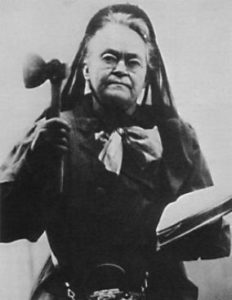Carrie Nation wasn’t the type of lady you’d invite to your after-work happy hour celebrations. She was a temperance leader who could express her displeasure with verse, song, and a hatchet.
Her two periods as a Texas resident preceded her temperance activities. But her roots in the movement were inspired by her experiences here.
Carrie (whose name was also spelled “Carry”) was born in 1846 in Kentucky. She and her family moved to Missouri, and then to Texas in 1862 as the Civil War was ramping up. Carrie was a teenager at the time.
Carrie married Charles Gloyd, a physician, in 1867. Gloyd was an alcoholic. They separated after they had a daughter, and he died in 1869.
It is understandable how being married to an alcoholic can influence one’s own view of alcohol. Carrie developed a strong attitude against it.
She moved back to Missouri, and married again, this time to David A. Nation, in 1874. Nation was an attorney, journalist, and minister. They bought a cotton plantation in Brazoria County. The venture proved unsuccessful as neither Carrie nor David were knowledgeable about farming. David moved to Brazoria to practice law. Carrie became a hotel operator in West Columbia, where today a state historical marker sits at the site. Eventually they moved to Richmond, where Carrie managed another hotel.
They moved back to Missouri, where Carrie managed another hotel. The Nations divorced in 1901.
Her early temperance protests involved singing hymns and making cutting remarks toward saloon owners and patrons. Carrie came to believe that God had chosen her to speak of the ills of drink—and to do even more than that. She used a hatchet to destroy and damage bars and saloons.
“I felt invincible,” she is supposed to have said. “My strength was that of a giant. God was certainly standing by me. I smashed five saloons with rocks before I ever took a hatchet.”
Her hatchet became an important part of the Carrie Nation story. She was arrested many times and sold souvenir hatchets to offset the legal costs.
Carrie died in 1911 and was buried in Belton, Missouri, which today is part of the Kansas City metropolitan area. Her life preceded Prohibition, which went into effect in 1919 with the adoption of the 18th Amendment. Prohibition was repealed in 1933.

